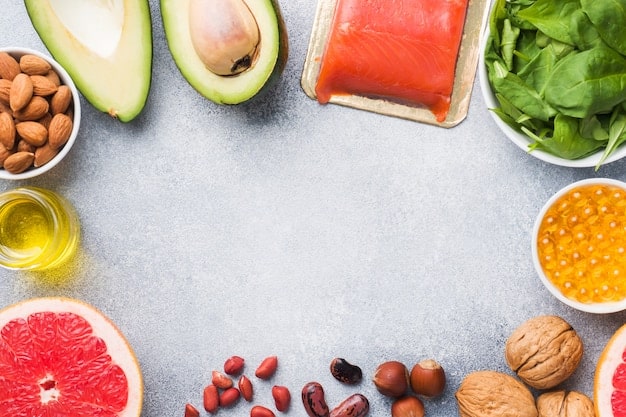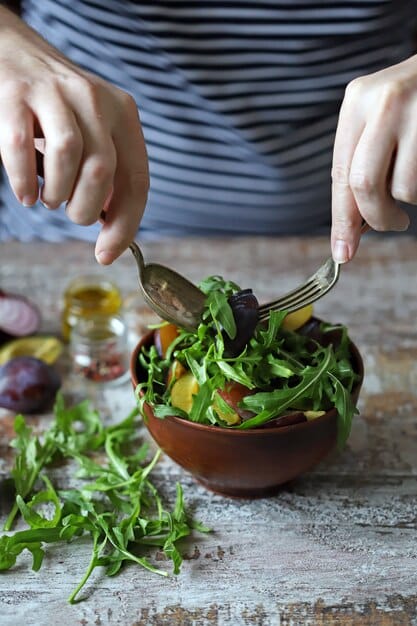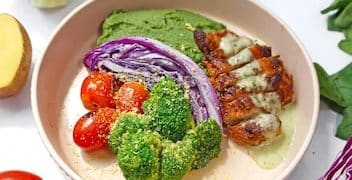The 7-Day Anti-Inflammatory Nutrition Plan: Your Guide to Less Bloat & More Energy

The 7-Day Anti-Inflammatory Nutrition Plan is designed to reduce bloating and increase energy levels by focusing on foods that fight inflammation and support overall well-being, helping you feel lighter and more energized in just one week.
Are you tired of feeling bloated and sluggish? The 7-Day Anti-Inflammatory Nutrition Plan: Reduce Bloating and Increase Energy Levels is your roadmap to feeling lighter, more energized, and ready to take on life. Dive in to discover how simple dietary changes can make a big difference in your overall well-being.
Understanding Inflammation and Its Impact
Inflammation is a natural process in the body, but chronic inflammation can lead to various health issues, including bloating and fatigue. Understanding what triggers inflammation and how to combat it through nutrition is crucial for maintaining optimal health. Let’s explore the basics of inflammation and its effects.
What is Inflammation?
Inflammation is the body’s response to injury or infection. It’s a necessary process for healing, but when it becomes chronic, it can damage tissues and organs.
The Impact of Chronic Inflammation
Chronic inflammation has been linked to numerous health conditions, such as heart disease, diabetes, and arthritis. Reducing inflammation through diet can help alleviate symptoms and improve overall health.

Here are some ways to combat inflammation:
- Eat Anti-Inflammatory Foods: Incorporate foods rich in antioxidants and omega-3 fatty acids.
- Avoid Processed Foods: Limit your intake of processed foods, which often contain inflammatory ingredients.
- Stay Hydrated: Drink plenty of water to help flush out toxins and reduce inflammation.
- Get Enough Sleep: Aim for 7-8 hours of sleep per night to support your body’s natural healing processes.
By understanding inflammation and its impact, you can take proactive steps to reduce it through a targeted nutrition plan. This sets the stage for a healthier, more energetic you.
Key Principles of the 7-Day Anti-Inflammatory Plan
The 7-Day Anti-Inflammatory Nutrition Plan is built upon several key principles designed to maximize its effectiveness. These principles focus on food choices, meal timing, and lifestyle adjustments that collectively work to reduce inflammation and boost energy. Let’s break down these essential guidelines.
Focus on Whole, Unprocessed Foods
Prioritize whole, unprocessed foods like fruits, vegetables, lean proteins, and whole grains. These foods are naturally rich in nutrients and free from additives that can promote inflammation.
Incorporate Healthy Fats
Include sources of healthy fats such as avocados, nuts, seeds, and olive oil. These fats provide essential fatty acids that help regulate inflammation.
Consider these points for optimizing your plan:
- Balanced Meals: Ensure each meal includes a balance of protein, carbohydrates, and fats.
- Regular Meal Timing: Eat meals at consistent times each day to help regulate blood sugar levels.
- Hydration: Drink plenty of water throughout the day to support detoxification and reduce inflammation.
Adhering to these key principles will enhance the anti-inflammatory effects of the nutrition plan. By focusing on whole foods, healthy fats, and balanced meals, you can effectively reduce bloating and increase energy levels, leading to improved overall health.
Foods to Embrace: Your Anti-Inflammatory Arsenal
The cornerstone of any effective anti-inflammatory plan is the selection of foods known for their potent anti-inflammatory properties. Incorporating these foods into your daily diet can significantly reduce inflammation and promote overall well-being. Here’s a guide to building your anti-inflammatory arsenal.
Berries
Berries are packed with antioxidants, which help combat free radicals and reduce inflammation. Blueberries, strawberries, raspberries, and blackberries are all excellent choices.
Fatty Fish
Fatty fish like salmon, mackerel, and sardines are rich in omega-3 fatty acids, which have powerful anti-inflammatory effects.

Leafy Greens
Leafy greens such as spinach, kale, and collard greens are loaded with vitamins, minerals, and antioxidants that help fight inflammation.
Here are more great options to include in your diet:
- Nuts and Seeds: Almonds, walnuts, flaxseeds, and chia seeds are excellent sources of healthy fats and antioxidants.
- Olive Oil: Extra virgin olive oil contains oleocanthal, which has similar anti-inflammatory effects to ibuprofen.
- Turmeric: This spice contains curcumin, a powerful anti-inflammatory compound.
By embracing these foods, you can create a diet rich in anti-inflammatory compounds that support your body’s natural ability to heal and thrive. A diverse and colorful plate is not only visually appealing but also nutritionally beneficial.
Foods to Avoid: Steering Clear of Inflammation Triggers
While incorporating anti-inflammatory foods is essential, it’s equally important to identify and avoid foods that can trigger inflammation. Certain foods can exacerbate inflammatory responses in the body, leading to bloating, fatigue, and other health issues. Let’s explore the key culprits to avoid.
Processed Foods
Processed foods, including packaged snacks, fast food, and sugary cereals, often contain high levels of unhealthy fats, sugars, and additives that promote inflammation.
Sugary Drinks
Sugary drinks like soda, fruit juice, and sweetened beverages can spike blood sugar levels and contribute to inflammation.
Here are some points to consider:
- Refined Carbohydrates: White bread, pasta, and pastries are quickly converted into sugar in the body, leading to inflammation.
- Excessive Alcohol: High alcohol consumption can damage the liver and increase inflammation throughout the body.
- Trans Fats: Found in fried foods and processed snacks, trans fats are known to promote inflammation and increase the risk of heart disease.
By steering clear of these inflammation triggers, you can create a dietary environment that supports healing and reduces the burden on your immune system. This proactive approach is essential for achieving optimal health and well-being.
Sample 7-Day Anti-Inflammatory Meal Plan
To help you get started with the 7-Day Anti-Inflammatory Nutrition Plan, here’s a sample meal plan that incorporates the principles and food choices we’ve discussed. This plan is designed to provide a balance of nutrients, reduce inflammation, and increase your energy levels. Remember to adjust portion sizes based on your individual needs.
Day 1:
Breakfast: Oatmeal with berries and a handful of almonds.
Lunch: Grilled salmon salad with mixed greens, avocado, and olive oil dressing.
Dinner: Chicken stir-fry with plenty of colorful vegetables and brown rice.
Day 2:
Breakfast: Smoothie with spinach, banana, berries, and almond milk.
Lunch: Leftover chicken stir-fry.
Dinner: Lentil soup with a side of whole-grain bread.
Continue this pattern, varying the ingredients as you wish:
- Day 3: Avocado toast with a poached egg for breakfast, quinoa salad for lunch, and baked cod with roasted vegetables for dinner.
- Day 4: Greek yogurt with berries and chia seeds for breakfast, turkey and spinach wraps for lunch, and vegetable curry with brown rice for dinner.
- Day 5: Scrambled eggs with spinach and tomatoes for breakfast, leftover vegetable curry for lunch, and grilled chicken with sweet potato fries for dinner.
By following this sample meal plan, you’ll have a solid foundation for a week of anti-inflammatory eating. Feel free to swap out meals and snacks based on your preferences and what you have on hand. The key is to focus on whole, unprocessed foods, healthy fats, and plenty of fruits and vegetables. You may also add:
- Day 6: Chia seed pudding with berries for Breakfast, large salad with salmon and lemon vinaigrette for Lunch, or Lemon herb roasted chicken with asparagus and quinoa for Dinner.
- Day 7: Tofu scramble for Breakfast, leftover salad for Lunch, and Vegetable pizza on whole wheat crust for Dinner.
Embrace the flexibility and enjoy the process of discovering new and delicious ways to support your health.
Lifestyle Factors to Enhance Your Plan
While nutrition plays a central role in reducing inflammation, certain lifestyle factors can significantly enhance the effects of your 7-Day Anti-Inflammatory Nutrition Plan. Incorporating these habits into your daily routine can amplify the benefits and contribute to overall well-being. Let’s explore some key lifestyle adjustments.
Regular Exercise
Engaging in regular physical activity helps reduce inflammation by improving circulation and supporting a healthy immune system. Aim for at least 30 minutes of moderate-intensity exercise most days of the week.
Stress Management
Chronic stress can trigger inflammation in the body. Practicing stress-reducing techniques such as meditation, yoga, or deep breathing exercises can help mitigate this effect.
Consider these points further:
- Adequate Sleep: Aim for 7-8 hours of quality sleep each night to support your body’s natural healing processes.
- Hydration: Drink plenty of water throughout the day to help flush out toxins and reduce inflammation.
- Mindful Eating: Pay attention to your body’s hunger and fullness cues, and avoid overeating.
By addressing these lifestyle factors in addition to your nutrition plan, you can create a synergistic effect that maximizes the reduction of inflammation and promotes long-term health. Small changes can lead to significant improvements in how you feel and function.
| Key Aspect | Brief Description |
|---|---|
| 🍎 Anti-Inflammatory Foods | Embrace berries, fatty fish, leafy greens, and nuts. |
| 🚫 Foods to Avoid | Limit processed foods, sugary drinks, and refined carbs. |
| 💧 Hydration | Drink plenty of water daily to flush out toxins. |
| 💪 Exercise | Incorporate regular physical activity for reduced inflammation. |
FAQ
▼
Inflammation is your body’s response to injury or infection. Chronic inflammation, however, can lead to various health issues like bloating, fatigue, and even chronic diseases. Reducing inflammation improves overall health.
▼
While this plan focuses on reducing inflammation and boosting energy, it can also support weight loss. By focusing on whole, unprocessed foods and reducing sugary and processed items, you may naturally lose weight.
▼
Customize the plan according to your needs. If you have allergies, replace the allergenic foods with suitable alternatives. Consult a healthcare provider or dietitian for personalized advice tailored to your specific dietary needs.
▼
Many people notice improvements in energy levels and reduced bloating within the first week. Long-term benefits, such as improved health markers, may take several weeks to months to become noticeable, with consistency.
▼
Yes, regular exercise can enhance the benefits of the anti-inflammatory nutrition plan. Aim for at least 30 minutes of moderate-intensity exercise most days of the week to support your body’s healing processes and overall well-being.
Conclusion
Embarking on the 7-Day Anti-Inflammatory Nutrition Plan: Reduce Bloating and Increase Energy Levels is a proactive step toward improving your health and well-being; by embracing whole, unprocessed foods and steering clear of inflammation triggers, you set the stage for a lighter, more energized you. Combining this with mindful lifestyle adjustments amplifies the benefits, paving the way for sustained wellness and a vibrant, healthier life.





